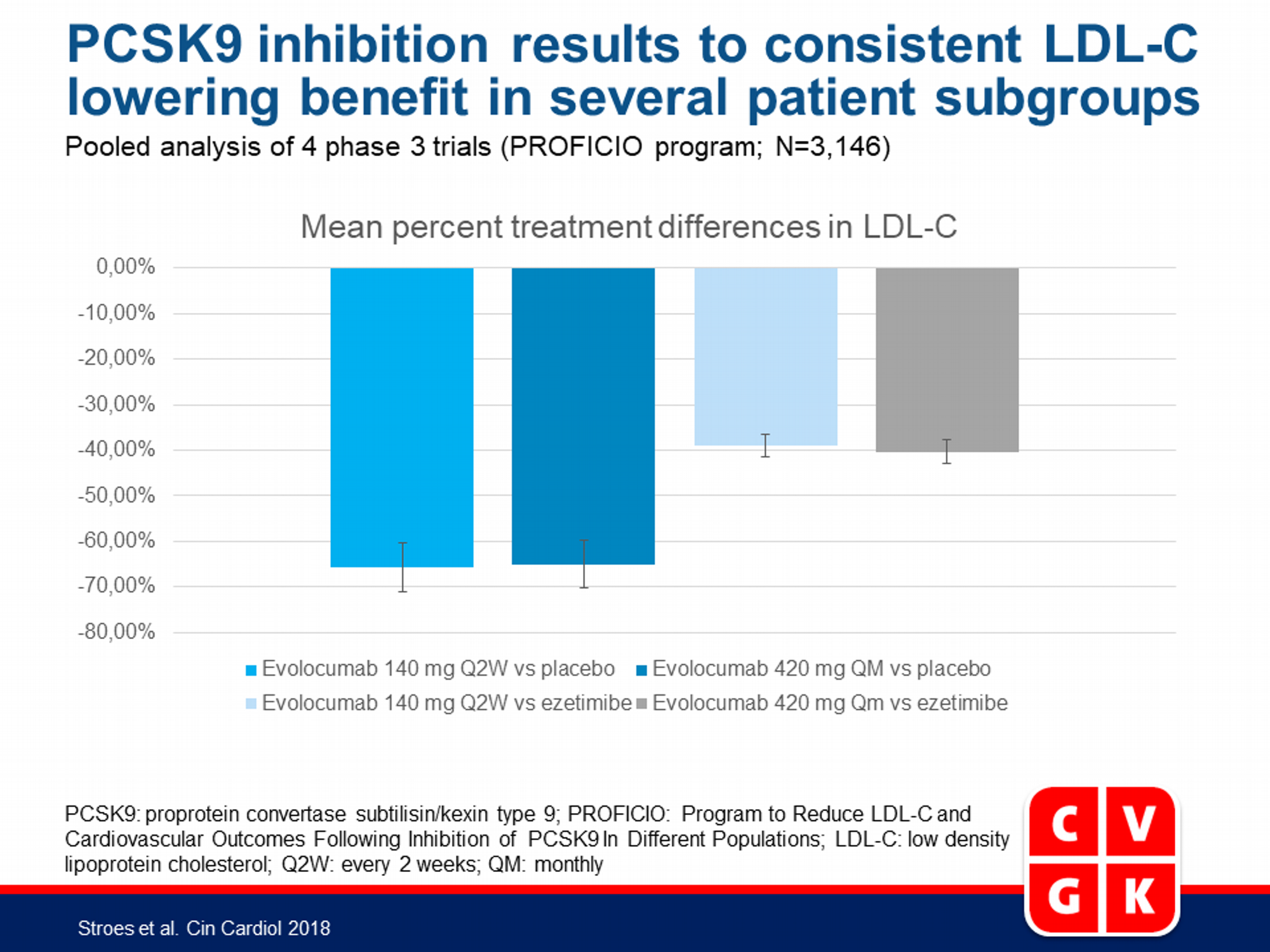PCSK9-remming resulteert in consistente LDL-c verlaging in verschillende patiëntsubgroepen
In PROFICIO toonde een gepoolde analyse van vier fase-3 studies significante grotere reducties in LDL-c met evolocumab vs placebo of ezetimibe voor alle subgroepen gebaseerd op demografie of ziektestatus.
Consistent LDL-C response with evolocumab among patient subgroups in PROFICIO: a pooled analysis of 3146 patients from phase 3 studiesLiteratuur - Stroes E, Robinson JG, Raal FJ et al. - Clin Cardiol 2018; published online ahead of print
Introductie en methoden
De Program to Reduce low density lipoprotein cholesterol (LDL-c) and Cardiovascular Outcomes Following Inhibition of proprotein convertase subtilisin/kexin type 9 (PCSK9) In Different Populations (PROFICIO)-trial onderzocht de effectiviteit en veiligheid van evolocumab in verschillende patiëntenpopulaties met hypercholesterolemia, waaronder in diegenen met familiale hypercholesterolemia of statine-intolerantie. In elke studie uit de PROFICIO-trial verlaagde evolocumab LDL-c substantieel en consistent [1-5].
Deze analyse van gepoolde data uit vier gerandomiseerde studies onderzocht de LDL-c reducties geassocieerd met evolocumab therapie in verschillende patiëntsubgroepen, gebaseerd op demografische en ziektekarakteristieken.
Deze gepoolde analyse includeerde vier placebo- of ezetimibe-gecontroleerde fase-3 trials en evalueerde het verschil in procentuele verandering in LDL-c vanaf baseline tussen elke evolocumab dosis en controletherapie, met de gemiddelde LDL-c waarden van week 10 en 12. Achtergrond lipidentherapie omvatte statine monotherapie of statine gecombineerd met ezetimibe. De evolocumab dosis bestond uit elke twee weken onderhuids 140 mg (Q2W) of maandelijks 420 mg (QM).
In totaal werden 3.146 patiënten met primaire hypercholesterolemie en cardiovasculair (CV) risico in verschillende mate, familiale hypercholesterolemie, en intolerantie voor ≥2 statines in het verleden gerandomiseerd en zij ontvingen minstens een dosis evolocumab of controletherapie.
Belangrijkste resultaten
In de gepoolde populatie was de gemiddelde leeftijd van deelnemers 57.8 jaar, 49.4% van de patiënten was vrouw, 91.5% was wit, en 54.1% ontving statines.
In de gepoolde analyse was het gemiddelde percentage behandelingsverschillen in LDL-c vanaf baseline:
- voor 140 mg Q2W evolocumab vs placebo: –65.7% (95%CI: –70.9 to –60.6)
- voor 420 mg QM evolocumab vs placebo: –65.0% (95%CI: –69.5 to –60.4)
- voor 140 mg Q2W evolocumab vs ezetimibe: –38.9% (95%CI: –41.3 to – 36.4)
- voor 420 mg QM evolocumab vs ezetimibe: –40.3% (95%CI: –42.6 to –38.0)
LDL-c veranderingen waren vergelijkbaar tussen de volgende subgroepen (consistent na correctie voor leeftijd, body mass index, baseline LDL-c, baseline PCSK9, en baseline statinebehandeling):
- mannen en vrouwen
- individuen <65 en ≥65 jaar
- individuen van verschillende rassen en etniciteit
- individuen met verschillende glucosetolerantie statussen
- individuen in CV risico categorieën
In het algemeen waren bijeffecten van 140 mg Q2W en 420 mg QM evolocumab vergelijkbaar met die gezien in de controlegroepen.
Conclusie
In een gepoolde analyse van vier fase-3 trials resulteerden 140 mg Q2W en 420 mg QM evolocumab in significant grotere LDL-c reducties vs placebo of ezetimibe, bovenop achtergrond statinetherapie, voor alle geanalyseerde subgroepen gebaseerd op demografie en ziektestatus, met vergelijkbare bijeffecten in vergelijking met controles.
Referenties
1. Blom DJ, Hala T, Bolognese M, et al. A 52-week placebo-controlled trial of evolocumab in hyperlipidemia. N Engl J Med. 2014;370:1809-19.
2. Giugliano RP, Desai NR, Kohli P, et al. Efficacy, safety, and tolerability of a monoclonal antibody to proprotein convertase subtilisin/kexin type 9 in combination with a statin in patients with hypercholesterolaemia (LAPLACE-TIMI 57): a randomised, placebo-controlled, dose-ranging, phase 2 study. Lancet. 2012;380:2007-17.
3. Hirayama A, Honarpour N, Yoshida M, et al. Effects of evolocumab (AMG 145), a monoclonal antibody to PCSK9, in hypercholesterolemic, statin-treated Japanese patients at high cardiovascular risk--primary results from the phase 2 YUKAWA study. Circ J. 2014;78:1073-82.
4. Koren MJ, Lundqvist P, Bolognese M, et al. Anti-PCSK9 monotherapy for hypercholesterolemia: the MENDEL-2 randomized, controlled phase III clinical trial of evolocumab. J Am Coll Cardiol. 2014;63:2531-40.
5. Koren MJ, Scott R, Kim JB, et al. Efficacy, safety, and tolerability of a monoclonal antibody to proprotein convertase subtilisin/kexin type 9 as monotherapy in patients with hypercholesterolaemia (MENDEL): a randomised, double-blind, placebo-controlled, phase 2 study. Lancet. 2012;380:1995-2006.

